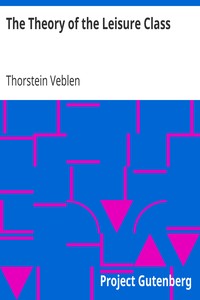The Theory of the Leisure Class by Thorstein Veblen
"The Theory of the Leisure Class" by Thorstein Veblen is a sociological and economic critique written in the late 19th century. The work analyzes the social structures around leisure and labor, particularly focusing on the concept of a "leisure class" that emerges in cultures marked by significant class distinctions and the exemption of the upper class from productive work. Veblen explores how this class perceives honor in non-industrial occupations, such as warfare,
governance, and religious activities, while industrial efforts are viewed with disdain. The opening of the book introduces the concept of a leisure class through an examination of historical institutions and practices found in feudal societies, such as those in Europe and Japan. Veblen explains how class divisions manifest in terms of labor and social status, emphasizing that upper classes traditionally engage in activities deemed honorable while relegating industrial labor to the lower classes. He describes how the differentiation and specialization of roles lead to the cultural construction of honorific leisure and how the social structures evolve, including the implications for women and the labor markets. Furthermore, he sets the stage for understanding the continuous tension between productive labor and the desire for social respectability that defines the dynamics of leisure throughout history. (This is an automatically generated summary.)
Read or download for free
| How to read | Url | Size | |||
|---|---|---|---|---|---|
| Read now! | https://www.gutenberg.org/ebooks/833.html.images | 725 kB | |||
| EPUB3 (E-readers incl. Send-to-Kindle) | https://www.gutenberg.org/ebooks/833.epub3.images | 295 kB | |||
| EPUB (older E-readers) | https://www.gutenberg.org/ebooks/833.epub.images | 303 kB | |||
| Kindle | https://www.gutenberg.org/ebooks/833.kf8.images | 525 kB | |||
| older Kindles | https://www.gutenberg.org/ebooks/833.kindle.images | 494 kB | |||
| Plain Text UTF-8 | https://www.gutenberg.org/ebooks/833.txt.utf-8 | 657 kB | |||
| Download HTML (zip) | https://www.gutenberg.org/cache/epub/833/pg833-h.zip | 286 kB | |||
| There may be more files related to this item. | |||||
About this eBook
| Author | Veblen, Thorstein, 1857-1929 |
|---|---|
| Title | The Theory of the Leisure Class |
| Note | Wikipedia page about this book: https://en.wikipedia.org/wiki/Conspicuous_leisure |
| Credits | Produced by David Reed, and David Widger |
| Reading Level | Reading ease score: 37.5 (College-level). Difficult to read. |
| Language | English |
| LoC Class | HB: Social sciences: Economic theory, Demography |
| Subject | Sociology |
| Subject | Leisure class |
| Category | Text |
| EBook-No. | 833 |
| Release Date | Mar 1, 1997 |
| Most Recently Updated | Jul 19, 2014 |
| Copyright Status | Public domain in the USA. |
| Downloads | 956 downloads in the last 30 days. |
| Project Gutenberg eBooks are always free! | |

